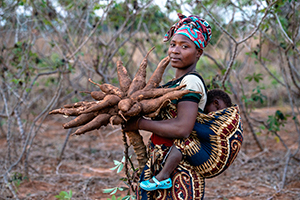
Two innovative projects that address climate change in developing countries — an imaginative program in Mozambique that produces starch for craft beer from cassava and another that helps cities worldwide develop resiliency to disaster — have won the coveted 2015 Corporate Adaptation Prize awarded by the University of Notre Dame Global Adaptation Index.
The annual honor underscores the growing movement by multinational and local corporations to develop resourceful contributions to climate adaptation in countries that rank in the bottom 50 of the ND-GAIN’s 180-country index. The index summarizes a country’s vulnerability to global climate challenges in combination with its readiness to improve resilience.
The winners include:
- Engineering leader AECOM and technology giant IBM, for developing a Disaster Resilience Scorecard to help communities understand, communicate and put into effect actions to reduce disaster risk and accelerate recovery from disasters. The scorecard supports the United Nation’s efforts to manage and reduce disasters by bringing together expertise and resources from the public and private sectors.
- DADTCO, a cassava processing company, for developing a mobile cassava starch plant for processing fresh cassava close to smallholder farmers instead of transporting the highly perishable roots over long distances to a central factory. The technology unlocks the opportunity for cassava, a major food crop in Africa, to replace expensive imported cereals and boost the national economy.
The winners will be honored at an event in connection with Climate Week NYC and the United Nations Sustainability Summit on Sept. 23.
“Through this award, ND-GAIN aims to enhance the world’s understanding of the importance of adaptation,” said Joyce Coffee, its managing director. “We encourage companies of every size to consider opportunities to increase resiliency where they do business, especially given the impact of droughts, fires, floods and superstorms on their bottom line.”
“We are very grateful and honored to receive this award as a medium-sized social enterprise,” DADTCO CEO Marius van Huijstee said. “This award recognizes that the local solutions for climate change are an important contribution to millions of the most vulnerable people. Our company is a processor of the ‘Rambo’ of the food crops: cassava. Cassava is, especially in Africa, ideal for resilience for food security of smallholder farmers. We give them a guaranteed market for their crop from which we will produce starch products that are used in the national food and beverage industry.”
“AECOM and IBM are pleased to see the Disaster Resilience Scorecard receive such a prestigious award from ND-GAIN,” Dale Sands, senior vice president and AECOM Environment global practices director, said. “Developing an impactful and user-friendly tool that supports cities and stakeholders with disaster risk reduction and preparedness is more important than ever. With capital losses resulting from increasing natural disasters, and growing urban populations and infrastructure around the world, it is critical to the sustainability and viability of our communities to adapt now to the changing climate.”
“As a result of climate change, cities and private organizations are increasingly aware of the frailties of growing urbanization and global supply chains, due to extreme events such as floods, heat waves and hurricanes,” said Peter Williams, CTO of Big Green Innovations at IBM, one of the authors of the Scorecard. “The Disaster Resilience Scorecard strives to decrease climate-related and natural disaster vulnerabilities for cities around the globe. Cities can now systematically assess their strengths and weaknesses — making their local communities smarter and safer."
Award submissions represented projects in over a dozen countries and topics ranged from reforestation, water and food to energy and health. They were evaluated on their measurable adaptation progress, scalability, market impact and partnerships.
Judges were Dan Bena, senior director of Sustainable Development and Outreach Operations, PepsiCo; Charlie Hough, vice president, Corporate Responsibility Strategy & Stakeholder Engagement, Novartis; Loren Labovitch, vice president and director of emerging markets, Hawksley Consulting; and Lisa Manley, executive vice president, Cone Communications.
Also serving as judges were Peter Mulvaney, senior manager, West Monroe Partners; Dethie Soumare Ndiaye, coordinator of the Climate Finance Unit, Centre de Suivi Ecologique; Nick Shufro, director, AR!SE and Sustainable Business Solutions, PwC; Aman Singh, vice president, Business + Social Purpose, Edelman; Chris Walker, director, United States, WBCSD; and Carolyn Y. Woo, Ph.D., president and CEO, Catholic Relief Charities.
Past winners include the Centre de Suivi Ecologique for its adaptation to coastal erosion; Novartis International for its Arogya Parivar “Healthy Family” initiative; Monsanto for its water-efficient maize for Africa project in partnership with the Gates Foundation and USAID; PepsiCo for its i-crop “more crop per drop” precision agriculture technology; and Ushahidi and MEDA for technology links for improved access and incomes, which provide rural farming families access to agricultural technology.
The Notre Dame Global Adaption Index’s mission is to enhance the world’s understanding of the importance of adaptation and inform private and public investments in vulnerable communities. It is part of the Climate Change Adaptation Program of the University of Notre Dame’s Environmental Change Initiative (ND-ECI), a Strategic Research Initiative focused on “science serving society,” and draws resources from across the campus.
ND-GAIN works with corporate and development leaders to manage risks made worse by climate change. Its efforts include research, measurement and analysis, corporate engagement, and outreach. In addition to the Country Index, ND-GAIN is creating an urban adaptation assessment and leads an annual State of Corporate Adaptation Survey to help further collective understanding of best practices, barriers, enablers and strategies to prepare for climate change in the corporate world. It awards the annual ND-GAIN Corporate Adaptation Prize that recognizes organizations making measurable contributions to creating adaptation to climate change, and it creates forums that explore what is new in adaptation around the globe.
Contact: Joyce Coffee, ND-GAIN, 574-807-9322, jcoffee@nd.edu
Originally published by at news.nd.edu on September 17, 2015.